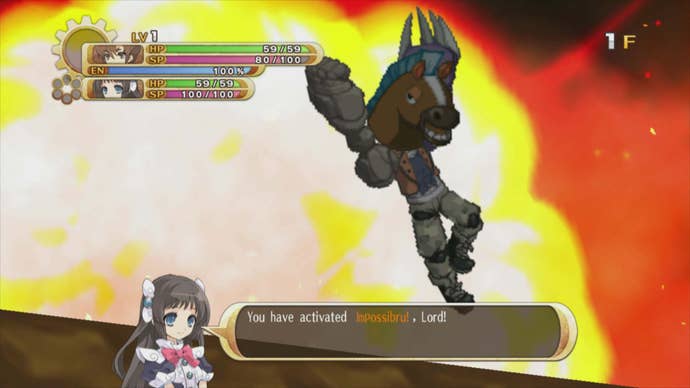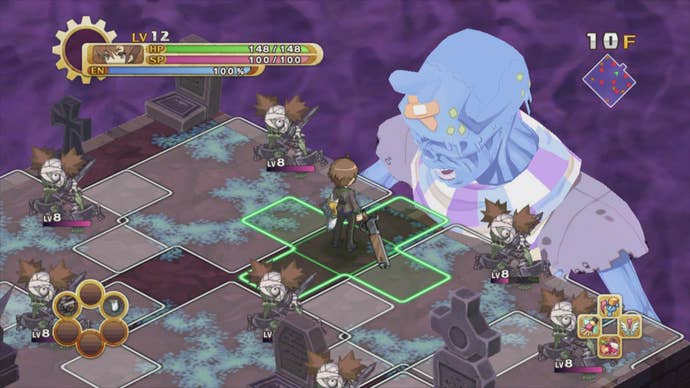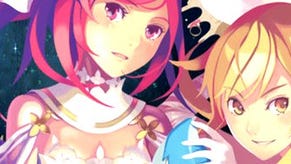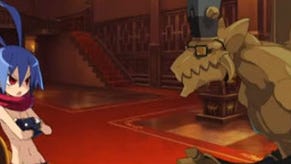Guided Fate Paradox Review: A Fine Game and a Crushing Disappointment
Nippon Ichi's latest roguelike seems great, until you stack it against its predecessor.
This article first appeared on USgamer, a partner publication of VG247. Some content, such as this article, has been migrated to VG247 for posterity after USgamer's closure - but it has not been edited or further vetted by the VG247 team.
This will turn into a review of Guided Fate Paradox in a little bit. Please bear with me.
The 2010 PSP exclusive Z.H.P.: Unlosing Ranger Versus Darkdeath Evilman was an isometric roguelike dungeon crawler from the developers of the Disgaea series. And while it shared some of the hallmarks of its better-known tactical JRPG counterpart (such as an overtly absurd sense of humor), Z.H.P. was at its heart a thoughtful and incisive story about heroism. It cast players as a random kid forced to assume the mantle of beloved super hero The Unlosing Ranger just before a climactic showdown with the aforementioned Mr. Evilman.
Unfortunately, this great responsibility was not accompanied by great power, except for the ability to be teleported to a bizarro hero-training universe every time you're about to die. Over the course of the battle with Darkdeath Evilman, you exercise that ability time and again, each time going back to train, a process which has you essentially mucking about in people's minds (represented as randomly generated dungeons) and pummeling their metaphysical hang-ups (enemies) until you've solved the big problems in their lives. And man, do these people have hang-ups. Along the way you help a loser rejected by society and driven to terrorism, a hit-and-run driver afraid to own up to his actions, a victim of child molestation, and a United States president willing to murder countless innocents overseas for the safety of those at home. Amazingly, the game grappled with weighty subject matter while mostly maintaining a light tone and good-natured (if off-kilter) humor.
Narratively, the message of Z.H.P. was that anyone can be a hero, provided they are determined to do what is right no matter the odds or the consequences. It fit perfectly with the theme of the gameplay, which was simply, "Losing builds character." Players started every dungeon at level 1, but their past excursions--whether they ended in triumph, retreat, or death--all contributed to how quickly they would level up in future explorations. Those who showed the same determination as the game's protagonist, who resigned themselves to endure, no matter the obstacles placed before them, would ultimately surmount any challenge. It was The Little Engine That Could for a complex, compromised world, told with the stylistic sensibilities of a JRPG.
I played Z.H.P. I loved Z.H.P. And sadly, Guided Fate Paradox is no Z.H.P., in large part because it's so very much Z.H.P.

While not technically a sequel, Guided Fate Paradox cribs most of its gameplay from Z.H.P. It's still a roguelike where you plow through randomly generated dungeons, starting from level 1 each time and improving exponentially faster the more you play through it. It's even similar on the narrative front. Instead of playing a nameless schlub who suddenly has to shoulder the title of "world's greatest super hero," you play as Renya, a 17-year-old boy who wins a shopping mall lottery one day, only to find out the prize is he must now become god.
While there's an over-arching story about an ages-old war between angels and demons, the bulk of the game consists of Renya answering the prayers of believers, this time by jumping into a machine and pummeling "aberrations" that have their fates headed in the wrong direction. (In another example of how similar the two games are, many of these aberrations reuse enemy designs from Z.H.P.) This allows the developers to embrace the same structure of vignettes as seen in its previous game, but where Z.H.P. was transparently an examination of what it means to be heroic, Guided Fate Paradox is more circumspect about what it has to say, scattering morals here and there, but never focusing on any of them long enough to make you think. Even the titular paradox of the game, which vigorously points to an examination of the incompatibility of destiny and free will, of an all-powerful diety writing the history of the world co-existing with man's ability to determine his own fate, is barely brushed against, much less pondered at length.
Like a network TV series, each episode plays out in formulaic fashion. The game introduces a believer, and Renya and his guardian angel Lilliel quickly form a theory as to what that believer's prayer must be. As they delve deeper into the believer's dungeon (all of which are nicely differentiated, offering entertainingly personal variations on the gameplay theme), the pair discover the believer's true wish, and then fulfill it in their own way, often with a heaping helping of vague JRPG making-the-rules-up-as-we-go-along narrative excuses. It's never completely clear if they actually need to understand what the believer's wish really is, as beating the tar out of everything in their way would seem to fix the problem just the same.
In between the episodes, Renya returns to Celestia, the heavenly home base of his angelic host, a dishearteningly uninspired motley crew of anime archetypes if ever there was one. Guided Fate Paradox ups the fan service quotient a bit over Z.H.P. by having the female angels dress in maid costumes of varying attempts at sexiness. There's the former demon Cheriel, whose every sentence consists of painfully clumsy innuendo (and who, as Renya so embarrassingly puts it, has breasts that are "Old Testament huge"). Then there's the tomboy Kuroiel, the way-too-obvious traitor Lanael, and the shut-in Neliel. On the male angel side, we have the resentful-of-the-Chosen-One Rakiel and the bland Galtion, who doesn't really have any discernible personality until the last third of the game. It's a shame the game spends so much time on the supposed intrigue between these characters, as their tales are uniformly tedious.
Ironically, the grinding-focused gameplay provides respite from the tedium of the angel side stories. Nippon Ichi's greatest strength as a developer has always been to construct a dizzying array of overlapping systems that give players the ability to play at their own pace and direct their character progression, and Guided Fate Paradox is no different. There are a ridiculous number of different systems and meters that hook up to one another, giving obsessive players plenty of nooks and crannies to exploit. Some are new, while others are so common in NIS games they may as well be the Konami Code, something you try in every title just because it works more often than not. For example, the game only appears to let you throw items and enemies on the grid in four cardinal directions, but you can actually throw diagonally by pushing the throw button a fraction of a second after switching the direction you're facing; That's a holdover going back at least to 2003's original Disgaea: Hour of Darkness.

Most of Guided Fate Paradox's key systems are pulled straight from Z.H.P. As players explore each dungeon with an angel in tow, they have an energy meter which depletes with each action. When the meter is full, every step restores both health and the pool of points used for special abilities. Once the energy meter is empty, health starts dropping rapidly and players must eat something soon or starve. Renya's life can also be prolonged by outfitting him with proper equipment, each piece of which boosts certain stats and grants access to one of the aforementioned abilities. Much of the equipment is outlandish in nature, and while some of it goes together in designed sets, it's likely you'll spend most of the game walking around as a hideous mish-mash of gear. (The frequent realization that the god of this world has a tendency to walk around wearing a lifeless tuna head, brandishing a novelty squeaky hammer and trundling along on tank treads makes up about one-third of the humor in this game. Dialog like, "I'm God. 'Sup?" makes up another third.)
No equipment lasts forever, unfortunately. After enough use, any weapon or armor will "burst," lessening its effectiveness. Despite the short-term drawback, you'll want to burst a whole bunch of equipment because doing so lets you take it to the blacksmith, who can repair it, improving its stats and durability in the process. (Note: Do not try to take your burst tuna head to a blacksmith in real life.) Bursting equipment also gives you access to holy icons that you can plug into a Divinigram as an act of godly body modification. Playing through dungeons will let you unlock more slots in the Divinigram for these icons, and then you can place holy artifacts that convey further stat boosts onto any previously filled slots. And you can boost those artifacts further by diverting energy lines through the Divinigram to flow into them after traversing as many implanted icons as possible. And we haven't even mentioned God Mode, the difference between having the blacksmith synthesize weapons or simply strengthen them, stealing items, or the Divine Summon system.
That last paragraph probably comes across as relentless gibberish, but that's common when talking about the systems in Nippon Ichi games. Each one on its own seems relatively straight-forward, but when you start to describe one in detail, you realize its dependent on everything else in the game, and pretty soon you're having to tell people all about everything and their eyes have long since glazed over. But here's the important part: It's entirely possible for the player to hack their way through the game wielding them like a hammer. But to really explore the game's depths (or at least to complete all the content in the games beyond the primary story), you really need to learn them inside and out, the scalpel approach is significantly more efficient. After 35 hours with the game (and perhaps twice that with Z.H.P.), I'm somewhere in between these two approaches. I doubt I've figured out everything about any one of these systems, so maybe I'm using them like a melon baller.
ConclusionIf it's not clear, I liked Guided Fate Paradox. As a game consisting of discrete systems that increase in complexity when overlapped and reward players who make an effort to understand them, it's fantastic. As a piece of game design that rewards failure almost as much as success and avoids discouraging the player, it's quite good. As a narrative-driven JRPG roguelike, it's certainly competent, if perhaps unspectacular. As a follow-up to Z.H.P., I found it disappointing, as if the creators could not see why their last game was so brilliant, and discarded its heart and soul to start anew with different criteria for success. So for me, this is the real paradox of Guided Fate Paradox. On its own, it is a fine game. Heartily recommended, even. But in light of its predecessor, it is a crushing disappointment.



